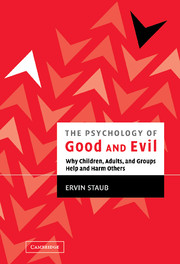Book contents
- Frontmatter
- Contents
- Preface
- Acknowledgments
- PART I INTRODUCTION AND CORE CONCEPTS
- PART II THE ROOTS OF HELPING OTHER PEOPLE IN NEED IN CONTRAST TO PASSIVITY
- 6 Helping a Distressed Person: Social, Personality, and Stimulus Determinants
- 7 Spontaneous (or Impulsive) Helping
- 8 Social and Prosocial Behavior: Personal and Situational Influences and Their Interactions
- 9 The Power to Help Others: Report on a Psychology Today Survey on Values, Helping, and Well-Being
- PART III HOW CHILDREN BECOME CARING AND HELPFUL RATHER THAN HOSTILE AND AGGRESSIVE
- PART IV THE ORIGINS OF GENOCIDE, MASS KILLING, AND OTHER COLLECTIVE VIOLENCE
- PART V THE AFTERMATH OF MASS VIOLENCE: TRAUMA, HEALING, PREVENTION, AND RECONCILIATION
- PART VI CREATING CARING, MORALLY INCLUSIVE, PEACEFUL SOCIETIES
- Appendix: What Are Your Values and Goals?
- Index
9 - The Power to Help Others: Report on a Psychology Today Survey on Values, Helping, and Well-Being
Published online by Cambridge University Press: 07 May 2010
- Frontmatter
- Contents
- Preface
- Acknowledgments
- PART I INTRODUCTION AND CORE CONCEPTS
- PART II THE ROOTS OF HELPING OTHER PEOPLE IN NEED IN CONTRAST TO PASSIVITY
- 6 Helping a Distressed Person: Social, Personality, and Stimulus Determinants
- 7 Spontaneous (or Impulsive) Helping
- 8 Social and Prosocial Behavior: Personal and Situational Influences and Their Interactions
- 9 The Power to Help Others: Report on a Psychology Today Survey on Values, Helping, and Well-Being
- PART III HOW CHILDREN BECOME CARING AND HELPFUL RATHER THAN HOSTILE AND AGGRESSIVE
- PART IV THE ORIGINS OF GENOCIDE, MASS KILLING, AND OTHER COLLECTIVE VIOLENCE
- PART V THE AFTERMATH OF MASS VIOLENCE: TRAUMA, HEALING, PREVENTION, AND RECONCILIATION
- PART VI CREATING CARING, MORALLY INCLUSIVE, PEACEFUL SOCIETIES
- Appendix: What Are Your Values and Goals?
- Index
Summary
A distressing feature of the decade just past is the selfishness that was one of its most salient characteristics. Not since the Gilded Age have so few reveled publicly in having so much, while the gap between rich and poor Americans widened and the middle class shrank. There is growing agreement that one key task of the '90s is to build a society that values helping as much as getting. The quality of individual life, the social good and even the welfare of humanity – protection of the environment and peace – depend on it.
But how do we move from a me-generation mentality to a more caring America? One way is to understand more about the people who do consistently reach out to others – what they are like, what leads them to help, what makes them different from the people who don't help.
Past studies other researchers and I have done show that altruism (caring about and helping others) is as basic a part of human nature as caring about ourselves. But how each of us develops – into caring, loving adults or people who ignore the needs of others – depends largely on how we are treated, what we see and what guidance we receive as we go along.
So it's vital to us as a society to know as much as we can about what leads to caring and helping. And it's important to us as individuals, too.
- Type
- Chapter
- Information
- The Psychology of Good and EvilWhy Children, Adults, and Groups Help and Harm Others, pp. 145 - 156Publisher: Cambridge University PressPrint publication year: 2003



